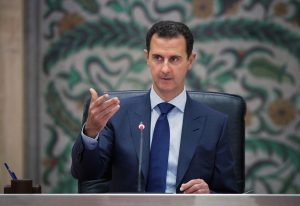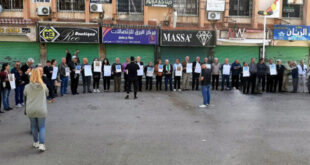Damascus, SANA – The members of the new government headed by Imad Mohammad Deeb Khamis on Monday took the constitutional oath before President Bashar al- Assad.
President al-Assad said to the new government members in a meeting with them after they were sworn in that the high hopes that citizens have for the new government and the difficult circumstances currently taking place in Syria place double responsibilities on the new Cabinet, and these responsibilities require exceptional efforts and at the same time require dealing with citizens in a transparent manner and keeping them informed of these efforts and their results, even if they don’t live up to their hopes.
He affirmed the importance of communicating with citizens via special offices in ministries or through field work, which will keep officials in touch with reality and with the citizens, and will also help them to become aware the people’s suffering, their needs, and their reactions to the performance of ministers and to the decisions they make.
President al-Assad asserted that field work, while important, mustn’t be motivated by showing off in front of the media, nor must it be at the expense of actual daily duties.
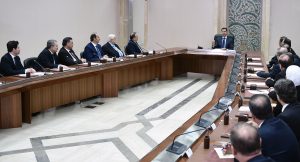
His Excellency stressed the need for national media establishments to tackle the issues that interest citizens and to address their concerns rather than just being the voice of the government, adding that if national media establishments do that with transparency and honesty, they will reclaim the citizens’ trust which in turn will bolster the popular base that supports the work of the government and state establishments.
President al-Assad stressed that citizens’ living conditions must be a priority for the government, with the most important step in this framework being working to control prices in cooperation with the civil society via joint mechanisms, in addition to preserving the value of the Syrian Pound, bolstering state resources via calculated importation, encouraging exportation, encouraging medium and small industries and agricultural industries, achieving justice in tax collection between the public and private sectors, monitoring and rationalizing expenditures starting with ministers and officials, rationalizing subsidies for essential materials by ensuring they reach beneficiaries, and enhancing the role of positive intervention establishments.
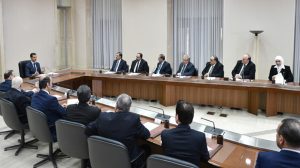
His Excellency said that the most important issue when it comes to economy is reconstruction, the first step of which was the project for regulating the fields behind al-Razi in Damascus and other similar projects that will be launched soon in Homs and elsewhere.
President al-Assad stressed the need to focus on these projects because they have immediate results in terms of revitalizing the economy and achieving positive results that affect citizens.
He also said that the government must give special attention to the families of the martyrs and injured members of the Army and Armed Forces by providing them with all their rights via simple and fast procedures, in addition to preparing studies on what could be provided to support national projects dedicated to injured people, like the “Injured of the Homeland” project which supports the injured, helps them acquire their rights, rehabilitates them, empowers them to reintegrate into society, and provides them with constant care.
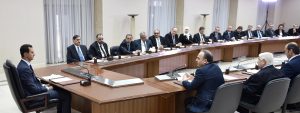
President al-Assad stressed the need for establishing a clear structure for the Prime Minister’s office and for the ministries that sets the mechanism of their work and the relation between them and the relation with other state establishments, including the People’s Assembly, asserting the importance of regulating these relations clearly so that ministers aren’t left unaccountable and so that People’s Assembly members don’t use accountability for personal motives.
The President elaborated by saying that implementing clear structures and mechanisms for ministries’ work, transparent media coverage, and improving administrative development can help limit corruption and assist judicial and supervision establishments in upholding the law and holding the corrupt accountable without exception, adding that lack of production is a form of corruption and it mustn’t be covered up.
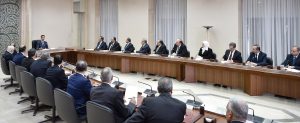
For their part, the Prime Minister and a number of ministers asserted that the difficult conditions resulting from the terrorist war imposed on the Syrian people only make them more determined to double their efforts to find solutions and alleviate the citizens’ burdens.
President al-Assad had issued on July 3rd decree no. 203 for 2016 on forming the new government headed by Khamis.
Hazem Sabbagh
 Syrian Arab News Agency S A N A
Syrian Arab News Agency S A N A

